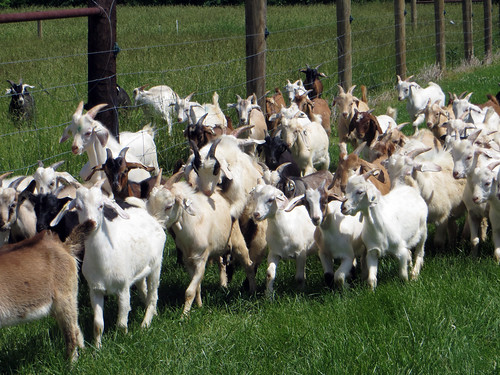The bucks were weighed on consecutive days (June 5-6) to determine starting their weights (d-0). Starting weights were calculated by averaging the two weights.
Starting weights ranged from 35.2 to 69.2 lbs. and averaged 47.3 ± 7.3 lbs. (21.5 ± 3.3 kg). This is almost 3 lbs. heavier than last year's test goats. The median starting weight was 45.9 lbs. (20.9 kg). All goats met the weight requirements for the test (35-70 lbs.). A little more than half of the goats weighed between 40 and 50 lbs.
During the adjustment period, 88 percent of the goats (n=67) gained weight. Weight gain ranged from (-4.5) to 11.7 lbs. and averaged 2.8 ± 2.9 lbs. (1.27 ± 1.32 kg). The standard deviation is larger than the average weight gain, indicating a wide variation in weight gain/loss among the 77 goats in the test. The weight gained or lost during the adjustment period does not factor into the test results. It is for information purposes only.
Final weights will be determined on August 28 and 29.
On June 5, the goats were handled to determine FAMACHA©, body condition, coat condition, dag, and fecal consistency scores. Scores were not significantly different from those recorded on May 30.
FAMACHA© scores ranged from 1 to 3 and averaged 1.6 ± 0.5. The median FAMACHA© score was 2. As expected, no goat required deworming.
Body condition scores ranged from 2 to 3 and averaged 2.2 ± 0.2. The median body condition score was 2. Coat condition scores ranged from 2 to 2.5 and averaged 2.0 ± 0.1. The median coat condition score was 2.0.
No goat had a positive dag score. Fecal consistency scores ranged from 2 (soft) to 4 (pellets) and averaged 3.9 ± 0.4. The median fecal consistency score was 4. A few goats had runny poop. It is almost impossible to collect a fecal sample from a goat with liquid feces. If a fecal sample cannot be obtained, there is no fecal consistency score for that goat, nor fecal egg count.
An individual fecal sample was collected from the rectum of each goat. As levamisole (Prohibit) is a fast-acting dewormer, this sample will give some indication as to the effectiveness of the May 30 deworming, in which the goats were treated with moxidectin (Cydectin® @ 2 ml/11 lbs), albendazole (Valbazen® @ 3 ml/50 lbs), and levamisole (Prohibit® @ 3 ml/50 lbs).
The goats will be worked next on Thursday, June 19 (d-14).
Download June 5 (d-0) report
Starting weights ranged from 35.2 to 69.2 lbs. and averaged 47.3 ± 7.3 lbs. (21.5 ± 3.3 kg). This is almost 3 lbs. heavier than last year's test goats. The median starting weight was 45.9 lbs. (20.9 kg). All goats met the weight requirements for the test (35-70 lbs.). A little more than half of the goats weighed between 40 and 50 lbs.
| Weight | # goats | % of goats |
| Less than 40 lbs. | 13 | 16.9% |
| 40-50 lbs. | 40 | 51.9% |
| 50-60 lbs | 18 | 23.4% |
| Over 60 lbs. | 6 | 7.8% |
During the adjustment period, 88 percent of the goats (n=67) gained weight. Weight gain ranged from (-4.5) to 11.7 lbs. and averaged 2.8 ± 2.9 lbs. (1.27 ± 1.32 kg). The standard deviation is larger than the average weight gain, indicating a wide variation in weight gain/loss among the 77 goats in the test. The weight gained or lost during the adjustment period does not factor into the test results. It is for information purposes only.
Final weights will be determined on August 28 and 29.
 |
| The bucks on the move |
On June 5, the goats were handled to determine FAMACHA©, body condition, coat condition, dag, and fecal consistency scores. Scores were not significantly different from those recorded on May 30.
FAMACHA© scores ranged from 1 to 3 and averaged 1.6 ± 0.5. The median FAMACHA© score was 2. As expected, no goat required deworming.
Body condition scores ranged from 2 to 3 and averaged 2.2 ± 0.2. The median body condition score was 2. Coat condition scores ranged from 2 to 2.5 and averaged 2.0 ± 0.1. The median coat condition score was 2.0.
No goat had a positive dag score. Fecal consistency scores ranged from 2 (soft) to 4 (pellets) and averaged 3.9 ± 0.4. The median fecal consistency score was 4. A few goats had runny poop. It is almost impossible to collect a fecal sample from a goat with liquid feces. If a fecal sample cannot be obtained, there is no fecal consistency score for that goat, nor fecal egg count.
 |
| Bucks in field of orchardgrass |
An individual fecal sample was collected from the rectum of each goat. As levamisole (Prohibit) is a fast-acting dewormer, this sample will give some indication as to the effectiveness of the May 30 deworming, in which the goats were treated with moxidectin (Cydectin® @ 2 ml/11 lbs), albendazole (Valbazen® @ 3 ml/50 lbs), and levamisole (Prohibit® @ 3 ml/50 lbs).
The goats will be worked next on Thursday, June 19 (d-14).
Download June 5 (d-0) report











